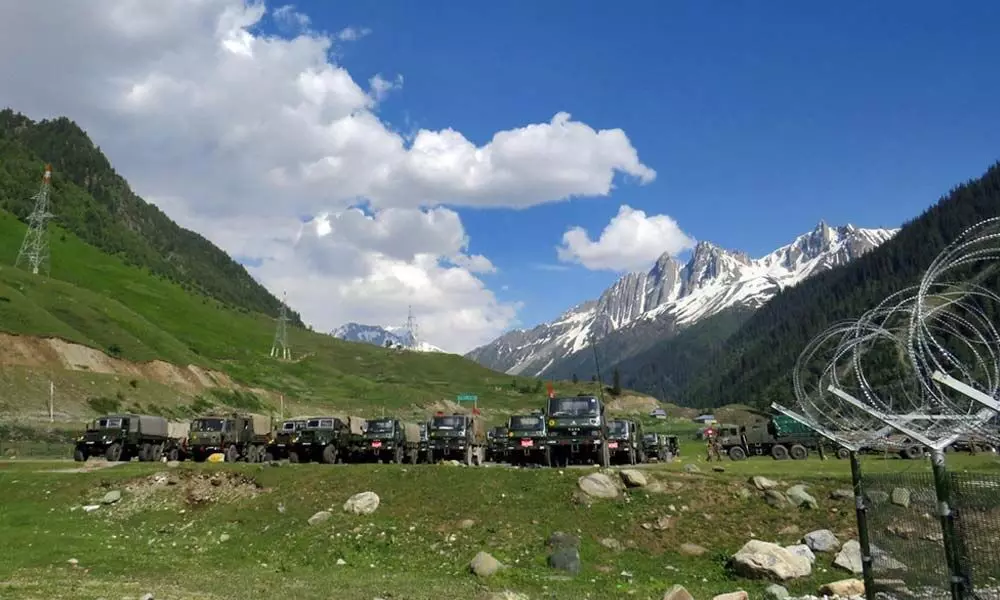Bloody Faceoff with China
 bloody Faceoff with China
bloody Faceoff with China- 20 Indian soldiers martyred
- China too suffers 43 casualties: Reports
New Delhi: Twenty Indian soldiers, including a Colonel from Telangana, were killed in a "violent face-off" with Chinese troops at Galwan Valley in Ladakh, the Army said on Tuesday, in the most serious escalation at the border in five decades.
An army statement late on Tuesday opened by saying Indian and Chinese troops "have disengaged" at the Galwan area where they earlier clashed on the night of June 15/16, indicating that they do not expect any fresh outbreak of violence in the area.
While news agencies claimed that sources had confirmed 43 Chinese soldiers have been killed or seriously injured because of intercepts, the Army's statement did not refer to this. A statement in the morning that confirmed the death of a Colonel and two jawans spoke of "casualties on both sides".
However, the editor-in-chief of Chinese state-run newspaper Global Times confirmed this, while adding that the Indian side shouldn't be "arrogant and misread Chinese restraint as weakness." Hu Xijin said that the Chinese side was holding back the number of its casualties as the government did not want to "stoke the public mood". He termed it a "goodwill gesture".
India blamed the clashes on "an attempt by the Chinese side to unilaterally change the status quo there", rebutting China's claims that Indian soldiers crossed the border.
This is the first fatal clash since 1975 between India and China, who fought a border war in 1962. Prime Minister Narendra Modi held meetings with Union Home Minister Amit Shah.
Defence Minister Rajnath Singh met with military chiefs twice as India discussed a response to the huge development.
India said the clash arose from "an attempt by the Chinese side to unilaterally change the status quo" on the border. "India is very clear that all its activities are always within the Indian side of the Line of Actual Control. We expect the same of the Chinese side," said Foreign Ministry spokesperson Anurag Shrivastava. Colonel B Santosh Babu of the Bihar regiment, Havildar Palani and Sepoy Ojha are three of the names confirmed by the Army earlier on Tuesday. "17 Indian troops who were critically injured in the line of duty at the stand-off location and exposed to sub-zero temperatures in the high altitude terrain have succumbed to their injuries. Indian Army is firmly committed to protect the territorial integrity and sovereignty of the nation," the Army's fresh statement said. The clash took place just as Chinese troops were getting ready to move away from a location per an agreement that was part of recent talks between the two sides to defuse tension. The Colonel was reportedly assaulted with stones and Indian soldiers retaliated, which led to close unarmed combat for several hours. The soldiers disengaged after midnight.
Beijing, in an aggressive statement, accused India of crossing the border, "attacking Chinese personnel", reported AFP. China's Foreign Ministry was quoted by Reuters as saying India should not take unilateral actions or stir up trouble. "China is raising strong opposition and stern representations to the Indian side on this," Chinese Foreign Ministry spokesperson Zhao Lijian said.
For more than six weeks now soldiers from both sides have been engaged in a stand-off at least two locations along the Line of Actual Control -- the 3,488 km de-facto boundary between India and China, and have rushed additional troops to the border. They have been facing each other at the Galwan River, which was one of the early triggers of the 1962 India-China war, and at the Pangong Tso -- a glacial lake at 14,000 feet in the Tibetan plateau.














